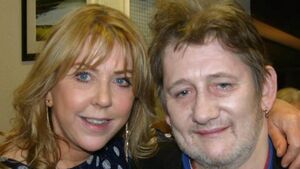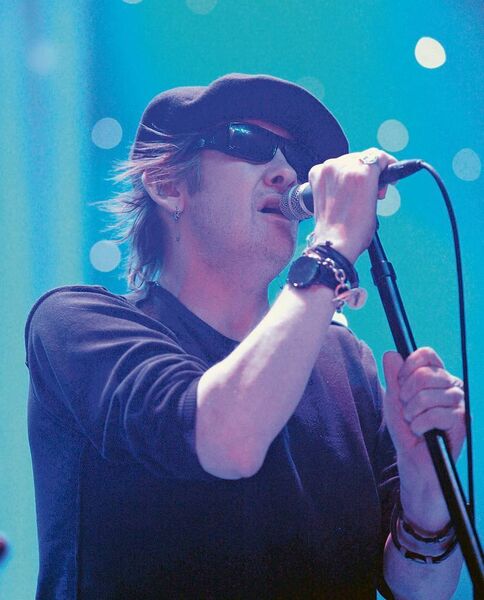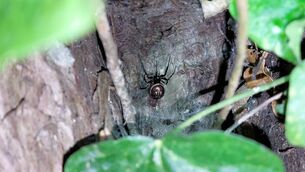Shane McGowan gave my generation a soundtrack to life

Catherine Gilmartin with legendary singer songwriter Shane MacGowan who passed away last Thursday aged 65.
The media outpouring after the death of the great Shane MacGowan is getting one thing wrong. The Pogues were never an Irish band and they were never a band whose intention was to popularise Irish traditional music. They were a band first and foremost – not to understand the difference reflects a lack of understanding of who this brilliant man and band were. His music and lyrics were characterised by a fusion of traditional Irish folk with punk rock, becoming a powerful voice for the Irish diaspora in London. MacGowan's lyrics often depicted the struggles, joys, and identity of the Irish immigrant experience, resonating deeply with those grappling with issues of displacement and belonging.
I had the pleasure to spend an evening with the legendary Pogues frontman when he supported a gig for the homeless in Mountmellick, Co. Laois, seven years ago. Well-known Ballina native Liam Brennan who has worked in the music business most of his life, is good friends with Brendan Fitzpatrick, Shane MacGowan’s personal driver, and through him set up a meeting for me with Shane. We certainly had a night to remember, hanging around with the fabulous Don Baker too. Liam said: “Shane brought Irish music to a totally new and good place in England and won over a huge new audience that adored him. In my DJ days of old, Shane and The Pogues were floor fillers every time. I mean is there anybody out there that has not heard of Shane MacGowan?”
When I met up with Shane at the fundraising dinner, I was immediately struck by what a genuinely nice guy he was. The dinner was in aid of PATH, (Portlaoise action to homelessness), which is committed to reaching and assisting people forgotten by society throughout Ireland and he said homelessness was very close to his heart – as he proved by supporting the event.
I got a warm welcome from McGowan as he took my hand and kissed it! Even though his body looked frail he had a twinkle in his eye and he gave me a big smile before taking a sip of white wine from a teacup. The charismatic singer and songwriter with The Pogues, was as famous for his abuse of alcohol and drugs as he was for being a musical genius. Being London Irish too, it was easy to talk to him about the 1980s and the London Irish scene. Shane introduced Irish music to millions of youngsters in the UK who had never experienced it and reinforced in all of us our sense of pride to be Irish at a time in London where many of us had experienced racism.
Shane was so warm and friendly and we chatted about knocking around London. He recalled: “I have memories of great times with my good friend, Chrissie Hynde (lead singer of rock band Pretenders), and I remember we used to frequent the White Lion in Covent Garden. They would let us go upstairs in the pub to escape mankind and be on our own to watch ourselves on TV but the bloody staff would all come up on their break to look at us and we were looking at us!” he laughed in that distinctive cackle of a snake hissing.
It may be slightly uncomfortable to remember but the late 1970s and 1980s were a period marked by social and economic challenges for the Irish communities in London, Birmingham, Manchester and across the UK. Being born to Irish parents who came over to London as part of the mass migration in the 50s and 60s was tricky. We were listening to the punk music of the Jam and the Clash and the Sex Pistols by day and coming home to a household where LPs from Val Doonican, Big Tom and Margo would be playing in the front room. We liked that old Irish music but it reminded us that we somehow had two different identities. Suddenly Shane and the boys burst on the scene and everything clicked. Here was a punk who inhabited the underbelly of London and tasted its seediest and loneliest core. But his music was uplifting and sentimental and raucous all at the same time – and it was inextricably pierced with Irishness.

Like so many of us growing up in England as the child of Irish parents, MacGowan grew up with a bit of an identity crisis. Not fully Irish (because of our accents) but not English either. Shane’s father had gone to university and was very cultured and Shane looked to be following in his footsteps; he was very bright and was reading at a very early age. He won a scholarship to Westminster by writing essays but sadly got kicked out for his drug taking.
A sensitive soul, his background deeply affected him and at the height of the troubles in Northern Ireland in the 1970s he felt guilty about not joining the IRA and making a stand for Ireland, but he admits he didn’t have the nerve – so he wrote music instead about the troubles and racism at that time. The Pogues’ is about men who were wrongly imprisoned for the 1974 bombing of two Birmingham pubs that killed 21 and injured 182. MacGowan says the men were guilty of nothing more than “being Irish in the wrong place and at the wrong time”. The song was banned by British radio.
In early 2000, Shane fell out with his friend Sinead O’Connor (another special Irish soul RIP), who reported him to the police for his heroin abuse. Eventually MacGowan made up with her when he realised that she only did it because she was worried about his health and cared about him so much. Shane went into rehab in London’s Priory Hospital but it didn’t work, he came out worse than ever. He also fell out with his band over his drinking and unreliability but they soon took him back and the hits continued.
Being a strong Catholic, Shane’s favourite saints were Saint Francis of Assisi and Saint Martin de Porres and as a young teenager he thought about becoming a priest – I speak for many when I say I’m glad he didn’t!
So many songs referenced London and were places that we knew and grew up in – places that young Irish immigrants were also settling in. From to the , walking home from parties to . We were proud to be associated with Shane and his madness and his genius and his Irishness – even if our parents would put their hand to their mouth exclaiming about “that terrible man with the awful teeth who was letting down all the decent Irish with his bad language”. He was our guilty secret.
Then he had Christmas hit and played with The Dubliners on the Late Late Show and he was suddenly mainstream. But we continued to love him and dance to him and drink with him and fall in love as his songs provided the backdrop to our lives. Our weddings had the first dance where the couple would sway to and stare at each other and whisper “you are the measure of my dreams”, and we’d have the last dance crashing around in wild circles with old uncles and aunts over from Ireland in the middle jumping up and down to .
I spoke to my friend this week, Sean Walsh, former Director of Ballina Arts Centre, who had plenty to say about the death of one of Ireland’s greatest songwriters.
“I remember when The Pogues made their first appearance on the Late Late Show in the early 1980s. It was scandalous! This irreverent gang of Plastic Paddies, wearing cool clothes and looking like they didn’t give a damn about anything. They were like the Rolling Stones, there was an air of danger about them. They looked decadent and bohemian.
“A lot of traditional Irish music purists were outraged and appalled that this bunch of punks were messing around with this sacred music. I loved it. As somebody who was into music, it made Irish traditional music more appealing to me. I was into hard rock and heavy metal at the time, and Irish trad was something that was old fashioned, fusty and not cool to me and the people I hung around with. But The Pogues changed all that. They made it relevant and exciting and that was it. I was in,” exclaimed Sean.
“When you see people like Bob Dylan, Tom Waits and Bruce Springsteen singing his praises, you know that he was highly regarded by the most highly regarded. A few years ago, Dylan was playing in Dublin and after the gig, entertained MacGowan in his hotel room. They spent the night talking about music and literature and probably had a glass or two of something. That would have been an amazing meeting. I don’t know how they managed to communicate but I’m sure they found a way… two raspy, wheezing, incoherent voices managing to find a common tone and tongue. Two of the finest song poets to have emerged in our lifetimes. Two rebels and iconoclasts, both took old traditions and used them to break new ground in what some people call ‘popular’ music. All the great music and songs. They will be sung for a long time and his name will be remembered. One of the greats!”
Shane MacGowan allowed us to be unapologetic about our Irish heritage as well as appealing to generations of emigrants navigating the complexities of identity in a foreign land. The Pogues’ music captured the essence of London Irish life and fostered a sense of pride and camaraderie among the community and to similar exiled communities across the world.
You were the soundtrack to so many of our lives Shane. Thank you.





